2018 年安徽省普通高中会考英语真题及答案
本试卷分为第 I 卷和第 II 卷,共四部分,八大题。第 I 卷 6 页,为选择题;第 II 卷 2
页,为单词拼写和书面表达题。全卷满分 100 分,考试时间为 90 分钟。
注意事项:
第 I 卷(选择题)
1.答题前,请将自己的姓名、座位号用钢笔或黑色水笔填写在答题卡上,并用 2B 铅笔
在答题卡规定位置上将自己的座位号、考试科目涂黑。考试结束时,请将试卷和答题卡一
并交回。
2.请将所有选择题的答案涂在答题卡上。每一小題只能从所给选项中挑选一个选项,并
用 2B 铅笔在答题卡上把该题对应的答案标号涂黑。如需改动,要用橡皮擦干净后,再涂另
一个答案.选对得分:不选、错选或多选均不得分。
I. 关键词语选择 (共 5 小题:每小题 1 分,满分 5 分)
第一部分 听力 (共三大题,满分 20 分)
听下面五个句子。从每小题所给的 A、B、C 三个选项中选出你所听到的单词或短语。每
B. warn
个句子读两遍。
1. A. win
2. A. choice
3. A. lively
4. A. prevented
5. A. turn off
II. 短对话理解 (共 5 小题:每小题 1 分,满分 5 分〉
B. chance
B. lovely
B. protected
B. put off
C. wait
C. cheese
C. likely
C. pretended
C. cut off
听下面五段对话。每段对话后有一个小题,从每小题所给的 A、B、C 三个选项中选出一
C. Skating.
B. Swimming.
个最佳选项。每段对话读两遍。
6. What sport does the woman like?
A. Boxing.
7. What is the woman's opinion on the hotel?
A. Everything there is great.
B. The hotel is too expensive.
C. The service is disappointing.
8. Where does the conversation probably take place?
A. In a classroom.
9. How old is Tom?
A. 18.
10. What are the two speakers mainly talking about?
A. The building.
III. 对话和独白理解 (共 10 小题:每小题 1 分,满分 10 分)
B. In a clinic.
B. 20.
C. 22
B. A fire.
C. A gas station.
C. In a park.
听下面三段对话或独白。每段对话或独白后有几个小题,从每小题所给的 A、B、C 三个
选项中选出一个最佳选项。每段对话或独白读两遍。
听下面一段对,回答第 11 至第 13 小题。
11. What is the woman doing?
A. Moving to Australia.
B. Sending her address.
�
B. Next week.
C. Next month.
B. America.
C. New Zealand
B. For work.
C. For study.
B. By telephone.
C. Seeing her friend off.
12. Why is the man going abroad?
A. For travelling.
13. How will the speakers keep in touch with each other?
A. By e-mail.
C. By chatting online.
听下面一面一段对话,回答第 14 至第 16 小题。
14. When is the test actually?
A. Today.
15. Which country celebrates this holiday until noon?
A. France.
16. What is the probable relationship between the two speakers?
A. Strangers.
听下面一段独白,回答第 17 至第 20 小题。
17. How did Mr. Green go to work?
A. By bus.
18. When did Mr. Green get up?
A. At 7:30.
19. What did Mr. Green have for breakfast that day?
A. Nothing.
20. What does Mr. Green prefer to do in the morning?
A. Take exercise.
breakfast.
B. Fellow-travellers.
B. Lie in bed.
B. By train.
B. At 7:45.
C. Classmates.
C. By bike.
C. At 8:00.
B. Some bread.
C. A cup of coffee.
C.
Prepare
VI. 阅读理解 (共 20 小题;每小题 2 分, 满分 40 分)
第二部分 阅读理解 (共一大题,满分 40 分)
阅读下列短文,从每小题所给的 A、B、C、D 四个选项中,选出一个最佳选项。
A
No matter what your degree is, or where you got it from, graduation is always
going to be a time to celebrate your achievements and give yourself a well-deserved
praise.
From turning up in special dress to jumping into a fountain (喷泉) , graduation
traditions around the world are quite different.
Bristol University, UK
Graduates at Bristol are unusual in that they don't wear mortarboards (学位
帽) at all, because once, as a story goes, too many mortarboards got thrown from
Brunel's Clifton Suspension Bridge, and it was thought to be dangerous.
Kanazawa College of Art, Japan
At the graduation ceremony of this Japanese art school you can wear anything
you want, which drives media (媒体) crazy. The yearly ceremony has become so famous
that journalists turn up each year to see what the students are wearing.
New York University, US
After the graduation ceremony at New York University, students like to cool off
by jumping into the New York's Washington Square Fountain, still wearing their
purple graduation dress.
�
Sun Yat-sen University, China
Graduating students, who are dressed in old time clothing, take photos for their
graduation at Sun Yat-sen University in Guangzhou, Guangdong Province of China.
21. What does the underlined word "it" in the first paragraph refer to?
D. Achievement.
C. Graduation.
A. Degree.
B. Dress.
22. Graduates at Bristol University are unusual because _____.
A. they drive media crazy
B. they don't wear mortarboards at all
C. they are dressed in old time clothing
D. they jump down from a famous bridge
23. In which university do graduates jump into the fountain to cool off after the
ceremony?
A. Bristol University.
C. Kanazawa College of Art.
B. New York University.
D. Sun Yat-sen University.
24. Students in Sun Yat-sen University take pictures for their graduation in _____.
A. old time clothing
C. anything they like
B. fashion clothing
D. purple graduation dress
25. What is the text mainly about?
A. Modem dresses.
C. University courses.
B. Great achievements.
D. Graduation ceremonies.
B
When I was young, I lived on an island in the north of Scotland, but I went to
school in Edinburgh. It was a music school, and I studied the violin. We practiced
for six hours every day. Our school was a boarding school. At the end of the term,
we all packed our bags and our instruments to go home for the holidays. Most kids
went by train, or bus, or their parents took them home by car. Not me! I went home
by ferry (渡船) --- 14 hours overnight on the open sea. I loved it!
One summer I packed my suitcase and violin and said goodbye to my friends. I
took the train to the ferry station and then got on the ferry. When we started moving
away, I remembered a terrible thing! I left my violin on the train! I went to ask
one of the crew (船员) what to do, but he said he couldn't stop the ferry for me.
What should I do? What would my dad say? He'd be really angry! I was worried,
and didn't sleep all night.
The next morning I got off the ferry to meet my dad. I didn't want to look at
him. I told him what happened. He laughed. I looked at him and couldn't believe
it. Why was he laughing?
In my violin case, I always have a label with my address and a telephone number.
My dad told me, "A cleaner found your violin by the label on the train in London
and took it to the police. They called me. They put the violin on a plane and it
arrived an hour before you did." My dad had it in his car! Thanks to those people,
my violin was safe home!
26. Where was the writer's home?
A. On an island.
C. In Edinburgh.
B. In London.
D. In the south of Scotland.
�
27. Why was the writer worried?
A. He didn't sleep all night.
C. His dad would be angry.
B. He went back home alone.
D. He left his address on the train.
28. The underlined word "label" in the last paragraph probably means
A. 模型
B. 标签
C. 绰号
D. 唱片公司
29. Who found the writer's violin?
A. His father.
B. The police.
C. A cleaner.
D. A crewman.
30. What can be the best title for the text?
A. Travelling Violin
C. Unforgettable Train
B. Boarding School
D. Missing Suitcase
C
Do you know how words came into being? It is believed that some early people
invented certain sounds, in one way or another, to express thoughts and feelings,
actions and things, so that they could talk with each other. Later they agreed upon
certain signs, called letters, which could be put together to show those sounds,
and which could be written down. Those sounds, whether spoken or written in letters,
are called words.
The power of words, then, lies in their association - the things they bring up
to our minds. Words become filled with meanings for us by experience. The longer
we live, the more certain words bring back to us the happy and sad events of our
past, and the more we read and learn, the more the number of words that mean something
to us increases.
Great writers are those who not only have great thoughts but also express these
thoughts in words which have powerful effects on our minds and feelings. This clever
use of words is what we call literary style (文体) . Above all, the real poet is
a master of words. He can express his meaning in words which sing like music, and
which can move people to tears by their position and association. We should therefore
learn to choose our words carefully and use them correctly.
31. According to the text, words might have begun with _____.
A. signs
B. actions
C. sounds
D. letters
32. Sounds that are spoken or written in letters are called
A. words
B. poems
C. feelings
D. thoughts
33. What is paragraph 2 mainly about?
A. The learning of new words.
B. The importance of old words.
C. The change and development of words.
D. The relation of human experience with words.
34. In the last paragraph, the author suggests that we should _____.
A. talk with poets
C. choose poems carefully
B. use words skillfully
D. become great writers
35. The text is probably taken from _____.
A. an official document
C. an educational magazine
B. a sports newspaper
D. an adventure novel
D
�
“AuldLangSyne" is a song that everyone happily sings, which marks the start
of a new year. No one ever seems to know the words or what they mean, but in America,
it's as much a part of New Year's tradition as wine. But why?
The lyrics (歌词) to the song come from a poem written by the great Scottish
poet Robert Burns in 1788. The title, "Auld Lang Syne", is believed to be an old
Scottish way of saying "a long time ago". The opening lines of the song "Should
auldacquaintancebeforgotten,andneverbroughttomind?Shouldauldacquaintance
beforgotten,andauldlongsyne?" mean we should have a drink in honor of whatever
is passing, and remember old friends.
When the Scots moved to America in the 19th century, they brought the song with
them. But it was the Canadian bandleader Guy Lombardo who made it more popular.
In 1965, he explained to a reporter of Life Magazine how he himself came to link
the song with New Year's Eve: Auld Lang Syne is our theme (主题) song --- and was
long before anyone ever heard us on the radio. In part of western Ontario, where
there are a large number of Scots, it was traditional for bands to end every dance
with Auld Lang Syne. We didn't think it was known here." If you want to see Guy
Lombardo in action, check out his final show on the eve of 1977.
36. The title Auld Lang Syne probably means ____.
A. new year
B. music band
C. old friends
D. a long time
ago
37. Why do people in America sing Auld Lang Syne when New Year is coming?
A. In memory of the past.
C. In honor of Robert Bums.
B. For having good luck.
D. For family get-together.
38. When did the Scots bring Auld Lang Syne to America?
A. In 1788.
C. In 1965.
39. Who made the song Auld Lang Syne more popular in the US?
B. In the 19' century.
D. In 1977.
A. Robert Burns.
B. Guy Lombardo.
C. The Scots.
D. The reporter.
40. What is the text mainly about?
A. The start of a new year.
B. The history of America.
C. The development of a band.
D. The popularity of Auld Lang Syne.
第三部分 英语知识运用(共两答题,满分 20 分)
V. 完形填空(共 10 小题;每小题 1 分,满分 10 分)
阅读下面短文,从短文后每小题所给的 A、B、C、D 四个选项中,选出一个可以填入空
白处的最佳选项。
In the 1990s, there was a young man in Shanxi Province who liked paper-cutting
so much that he was apprenticed (做学徒) to a famous paper-cutting master. However,
the ___41___ and other apprentices were always telling him he had no ___42___ when
it came to paper-cutting. No matter how ___43___ he tried, they would always find
something ___44___ with the paper-cutting works he had made. So he was forced to
___45___ the workshop.
However, the young man wasn't going to ___46___. He decided that he would spend
all his time making paper-cutting works. And ___47___ he found a fault, he would
�
throw it away and start again. Years passed, and his paper-cutting works became
a little bit ___48___. Now, he has become a famous paper-cutting master.
It is ___49___ that one is challenged by being laughed at on the way to success.
If you never give up and are ___50___ to your dream, you will harvest a bright future
in the end!
41. A. lawyer
42. A. habit
43. A. far
44. A. wrong
45. A. run
46. A. give out
47. A. unless
48. A. easier
49. A. unusual
50. A. contrary
D. engineer
D. tool
D. soon c
D. different
D. leave
D. give away
D. whenever
D. stranger
D. impossible
D. devoted
B. doctor
B. ability
B. fast
B. proper
B. build
B. give up
B. even if
B. better
B. simple
B. grateful
C. master
C. excuse
C. hard
C. perfect
C. make
C. give back
C. though
C. longer
C. normal
C. used
第 II 卷(非选择题)
VI. 语法填空(共 10 小题;每小题 1 分,满分 10 分)
阅读下面材料,在空白处填入适当的内容(1 个单词)或括号内单词的正确形式。
The word "MOOCs" is short for "Massive (大规模的) Open Online Courses". MOOCs
are a kind of online courses, which __51___ (be) different from the face-to-face
traditional teaching courses. And ___52___ (they) aim is to make people study
___53___(free). They have changed the teaching method __54__ has lasted for
thousands of years, thus making learners receive knowledge in a new way.
Nowadays, people benefit a lot __55___ MOOCs. MOOCs can meet nearly everyone's
interest. Almost every subject can be found in MOOCs, and groups can ___56___ (create)
for students who have ___57___ same interests. Besides, MOOCs can benefit you
personally. You have the choice to try something new without ___58___ (have) to
pay.
MOOCs influence the teaching around the world greatly. Teachers and students
both have different ___59___ (role) in learning, making learning become an easy
and ___60___ (interest) thing.
第四部分 写作 (共两大题,满分 20 分)
VI. 单词拼写(5 小题;每小题 1 分,满分 5 分)
根据汉语提示和英文首字母完成下列单词拼写,使句意完整正确。
61. Frank is working hard for his g____(目标).
62. AI (人工智能) will o_____(提供)people much help.
63. I'm going to p_____(采摘)grapes in the garden this weekend.
64. They spent a whole night working out a s______(解决方法)to the problem.
65. "Building a community with a shared future for humanity" meets c_____(共同
的)interests around the world.
VII. 书面表达 (共 1 小题,满分 15 分)
假定你是学校学生会主席李华,想邀请外籍教师 Tony 来担任英语演讲比赛评委,并做
�
点评。谓给他写封邮件,内容主要包括:
1. 演讲主题:“一带一路:中国与世界”;
2. 比赛时间、地点。
注意:
1. 词数 100 左右;
2. 可以适当增加细节,以使行文连贯;
3. 文中不能出现与本人相关的共体信息;
4. 开头和结尾己给出,不计入总词数。
5. B
9. A
14.B
2.A
3.B 4.C
7. C
8. B
13.A
23. B
参考答案
I. 1.B
II. 6. C
III. 11.C
12.B
IV. 21. A 22. B
32. A 33. D
V. 41.C
VI.
57. the
VII. 单词拼写
61. goal(s)
VIII. One possible version
Dear Tony,
43.C
52. their
58. having
62. offer
51. are
42.B
34. B
35. C
36. D
37. A
38. B
39. B
40. D
44.A
45. D
53. freely
46. B
47. D
54. which/ that
48. B
49. C
50. D
55. from
56. be created
10. B
15. C
16. C
17. B
18. A
19. A
20. B
24. A
25. D
26. A
27. C
28. B
29. C
30. A
31. C
59. roles
63. pick
60. interesting
64. solution
65. common
How is everything with you? I'm Li Hua, chairman of the students' union of our
school. I am writing to invite you to be a judge at our English speech contest.
The topic of the speech is "Bell and Road: China and the World" In addition, the
contest is scheduled to be held at 9 a.m. on June 30th at the school lecture hall,
which will last about 3 hours. At the end of the contest, we hope you can make a
comment on the performances of the contestants. I would appreciate it if you could
accept our invitation. Please e-mail me if you have any questions.
I am looking forward to your reply!
Yours,
Li Hua
听力材料
I. 1. Tom, don't forget to warn Mary to keep away from the smoke.
2. I have no choice but to wait for him.
3. What a lovely day! Let's go for a picnic.
4. David pretended to be reading when the teacher came in.
5. The sports meeting was put off because of the heavy rain.
II. 6. W: I like skating rather than swimming.
M: But swimming and boxing are my favourite sports, you know.
7. M: This is a great hotel. You can get anything you want here.
W: Yes, but the service is not good.
�
8. M: I'm not feeling well. I have a cold.
W: Get some rest and take the medicine three times a day and you'll feel better.
If not, come back and see me.
9. W: Hi, Tom! I just saw a picture of your brother James --- he looks so much younger
than you.
M: Yes, he does. But he is actually two years older than me. He is twenty.
10. W: Did you bear all that noise on the south side of the building over there?
What happened?
M: Mary told me that there was a fire at the gas station, and it was quite big.
III. (Text 11)
W: I have heard you are moving to Australia.
M: Yes, I've got a job in Sydney.
W: Oh, that's great! I'm here to see you off.
M: Thank you.
W: I'm going to miss you.
M: Me, too. Let's keep in touch.
W: Yeah. Don't forget to get in touch when you settle down.
M: Trust me, I won't. I have your e-mail address.
W: OK! I look forward to hearing from you. Good luck and have a good trip!
(Text 12)
M: Did you study for the teat today? I was up all night studying for it, l hope
I can get a good grade.
W: Test? What teat? I didn't know we had a test today.
M: Ha-Ha! April Fool! I was just jolting! The test is next week.
W: Oh, thank heavens! You scared me! What is April Fool's Day anyway?
M: April Fool's Day is traditionally held on the fast of April. People play practical
jokes on their friends, just like what I did to you.
W: Does the whole world celebrate it?
M: No, but a lot of countries do. Some countries like New Zealand and countries
in South Africa only play jokes until noon. In other countries, like America, France
and Italy, the jokes last all day.
W: So, how did this crazy holiday start? What's the history behind April Fool's
Day?
M: The actual origin of April Fool's Day is a gray area. The earliest association
between April 1st and foolishness can date back to the year 1392.
(Text 13)
It was Monday morning. Mr. Green looked at his clock. It was half past seven. He
got out of bed quickly. Then he got dressed and washed his face. He wanted to catch
the train at 7:45. He was late, so he didn't have time for breakfast. He ran all
the way to the station and he got there just in time for the train. Mr. Green usually
has some bread and a cup of coffee for breakfast. He always says to his friends
at the office, "It is nice to have breakfast in the morning, but it's nicer to lie
in bed."
�
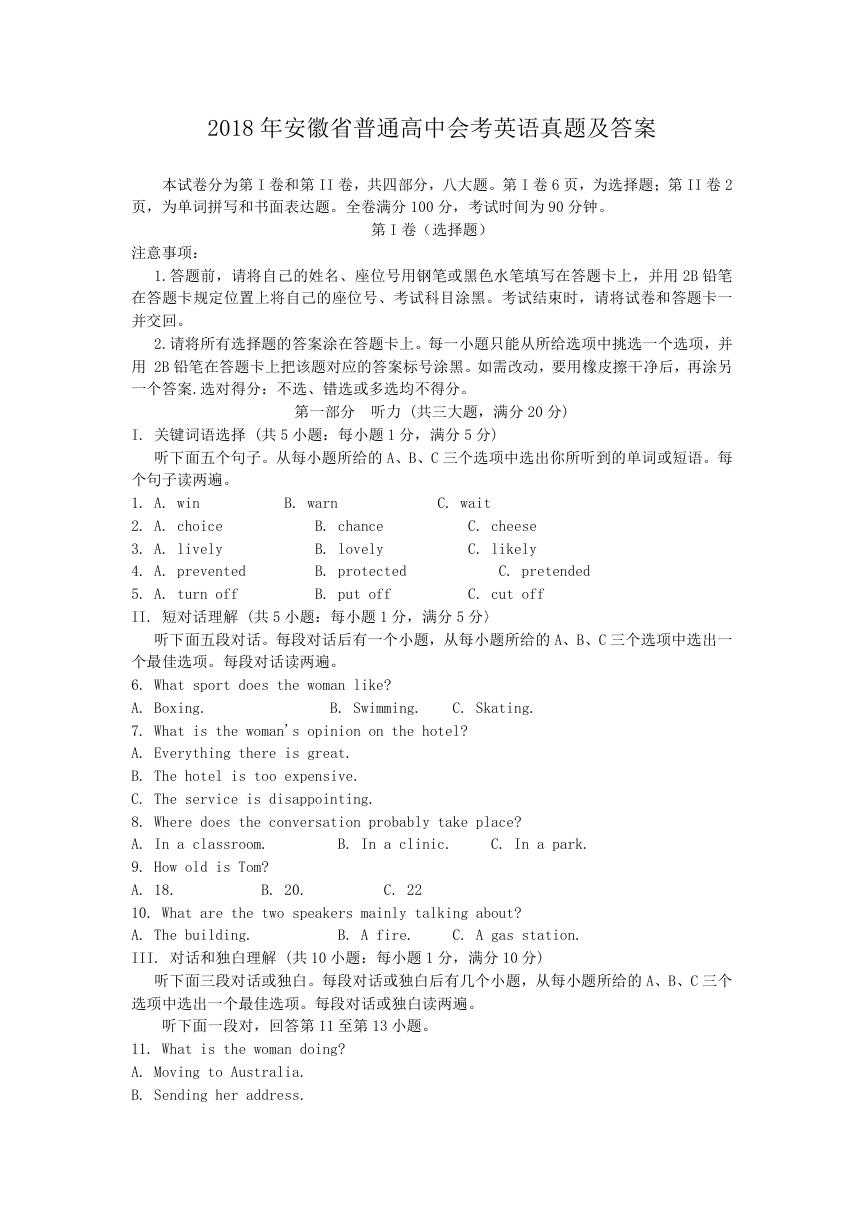
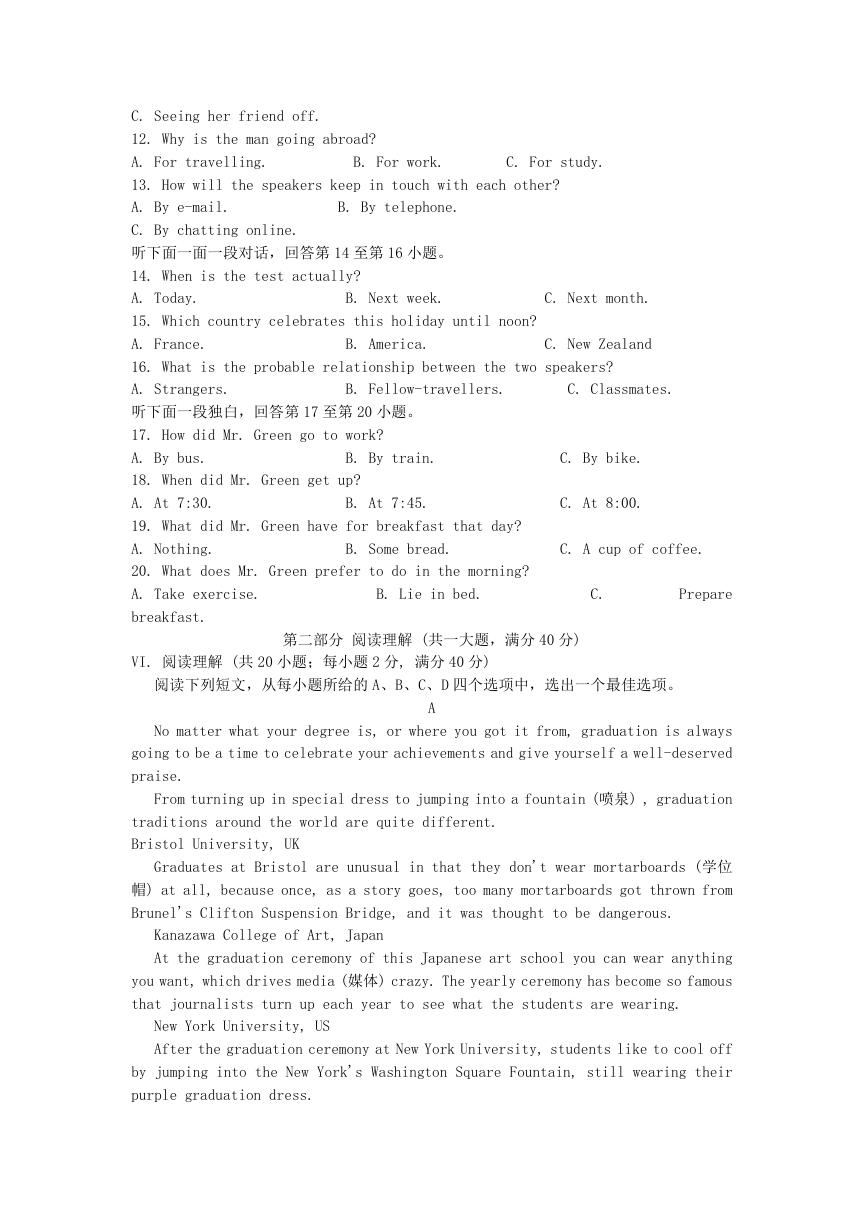
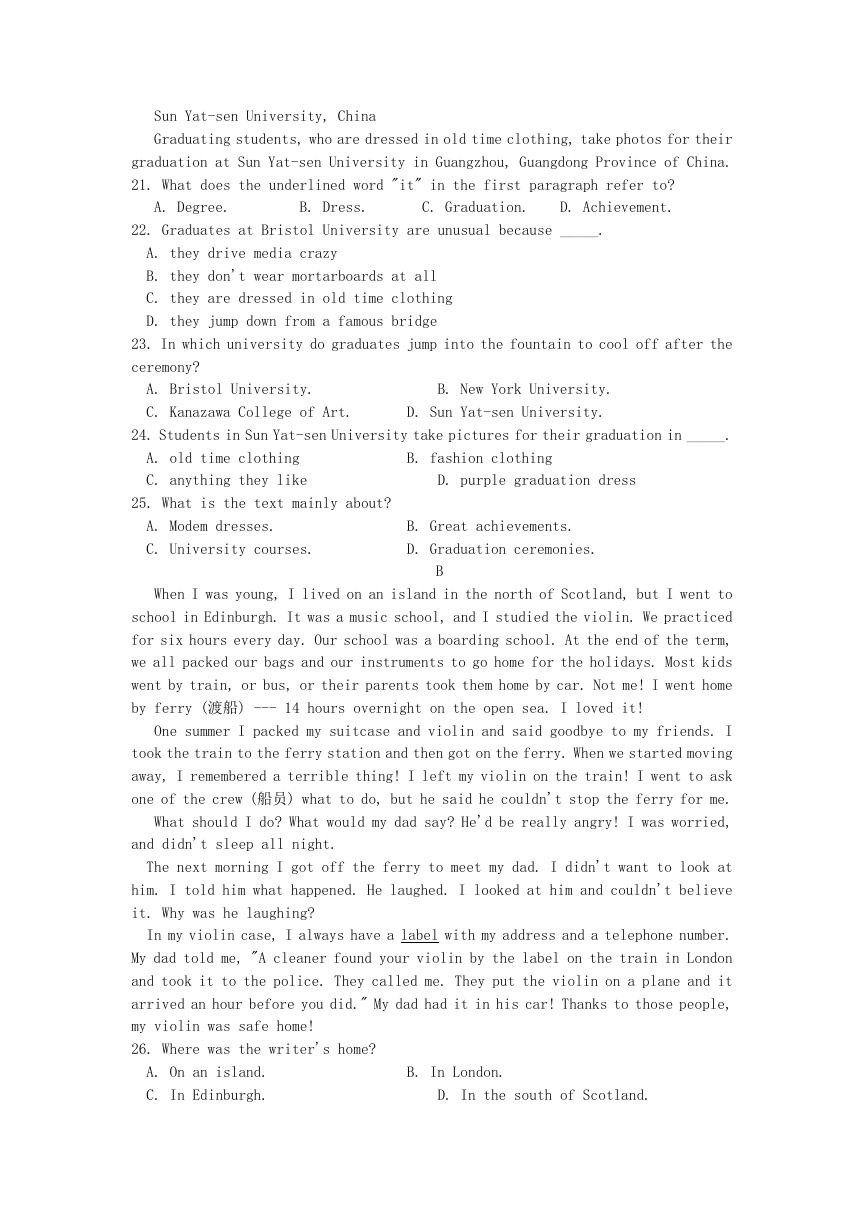
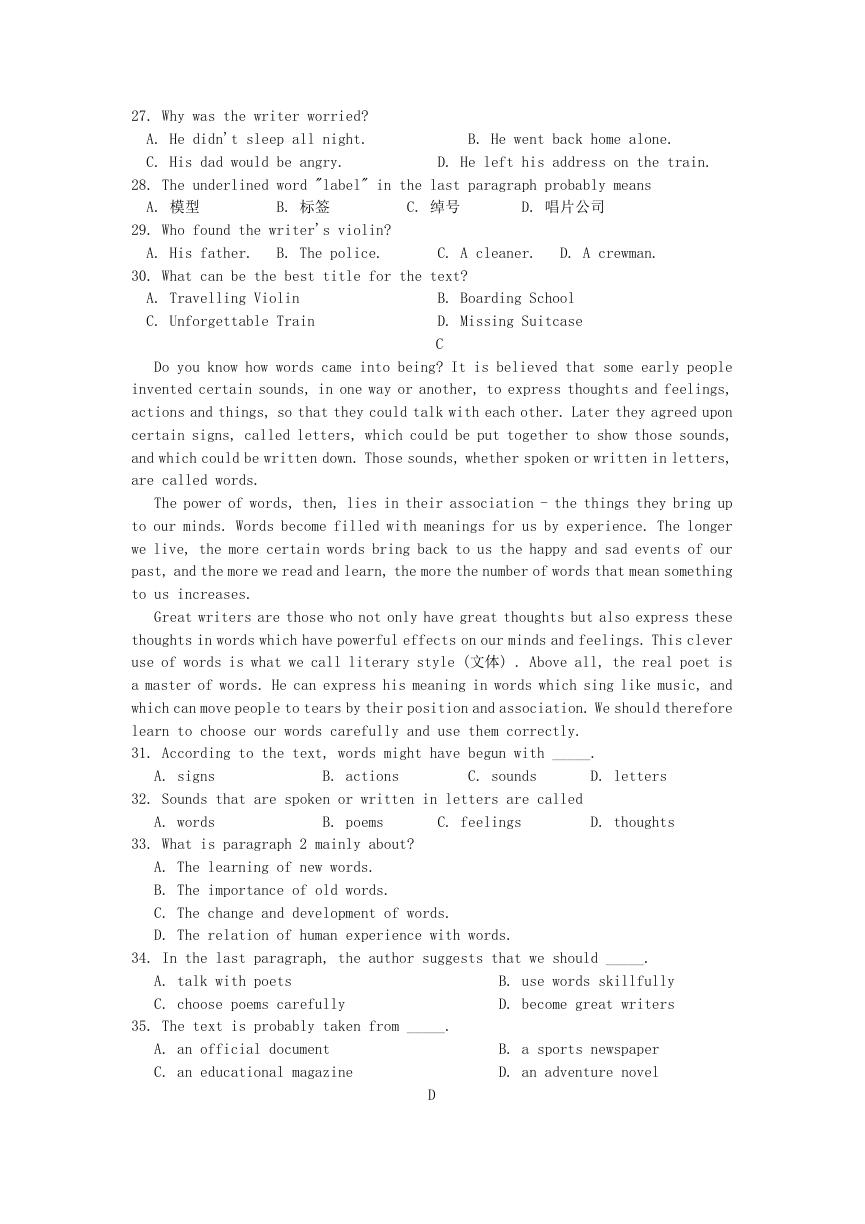

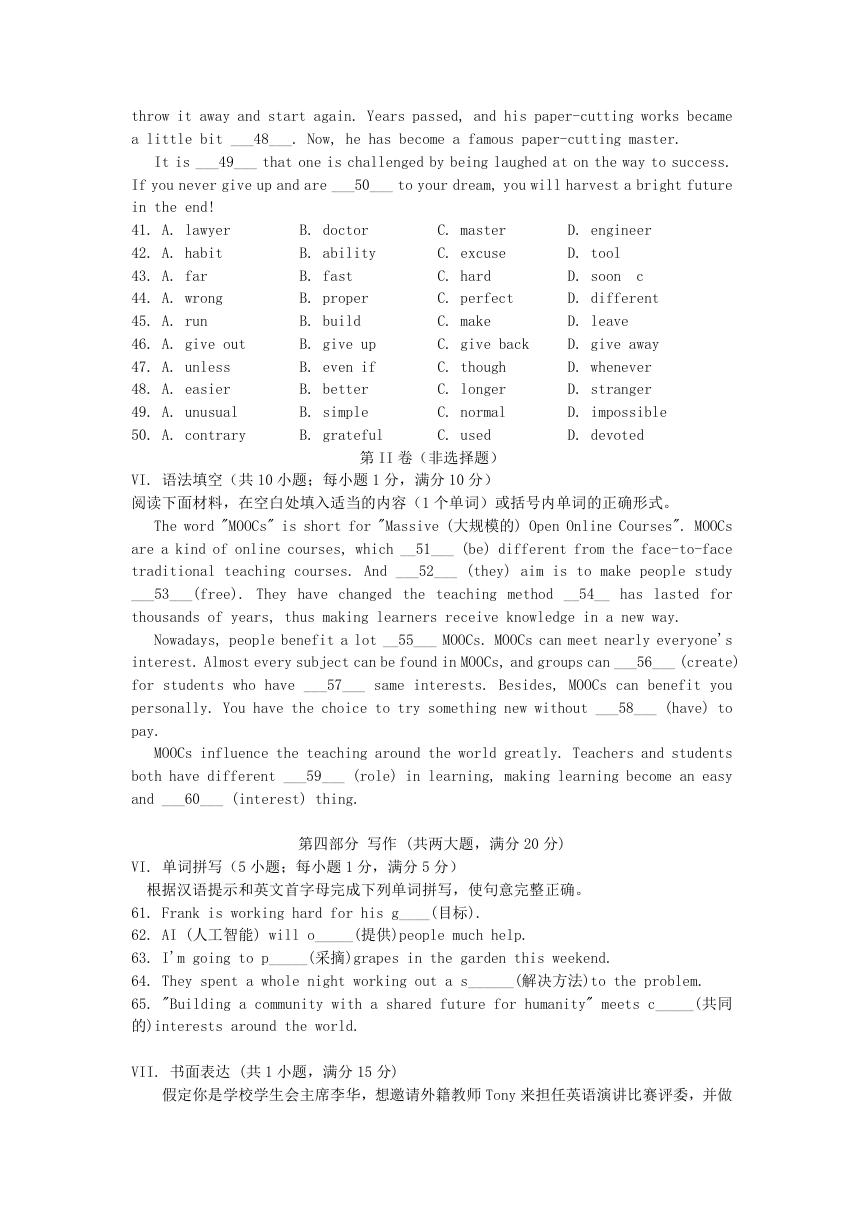
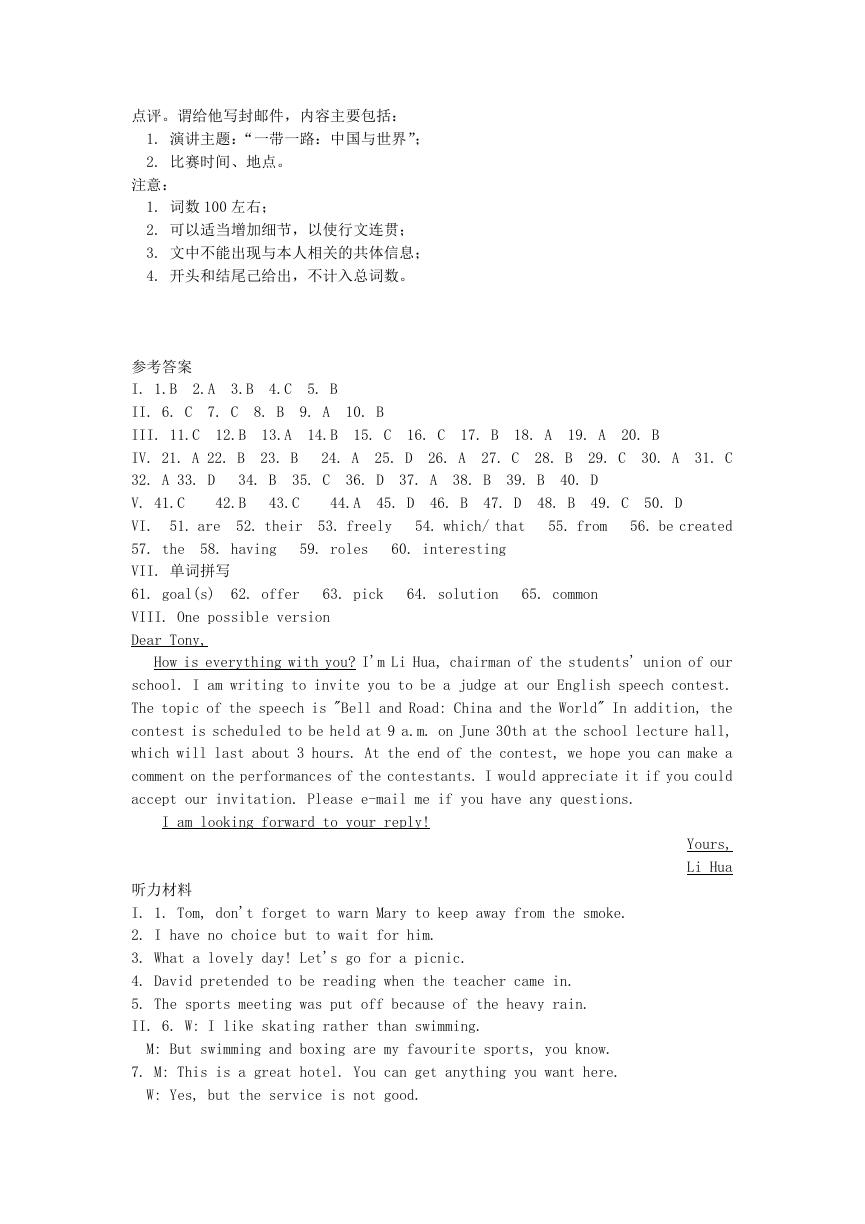
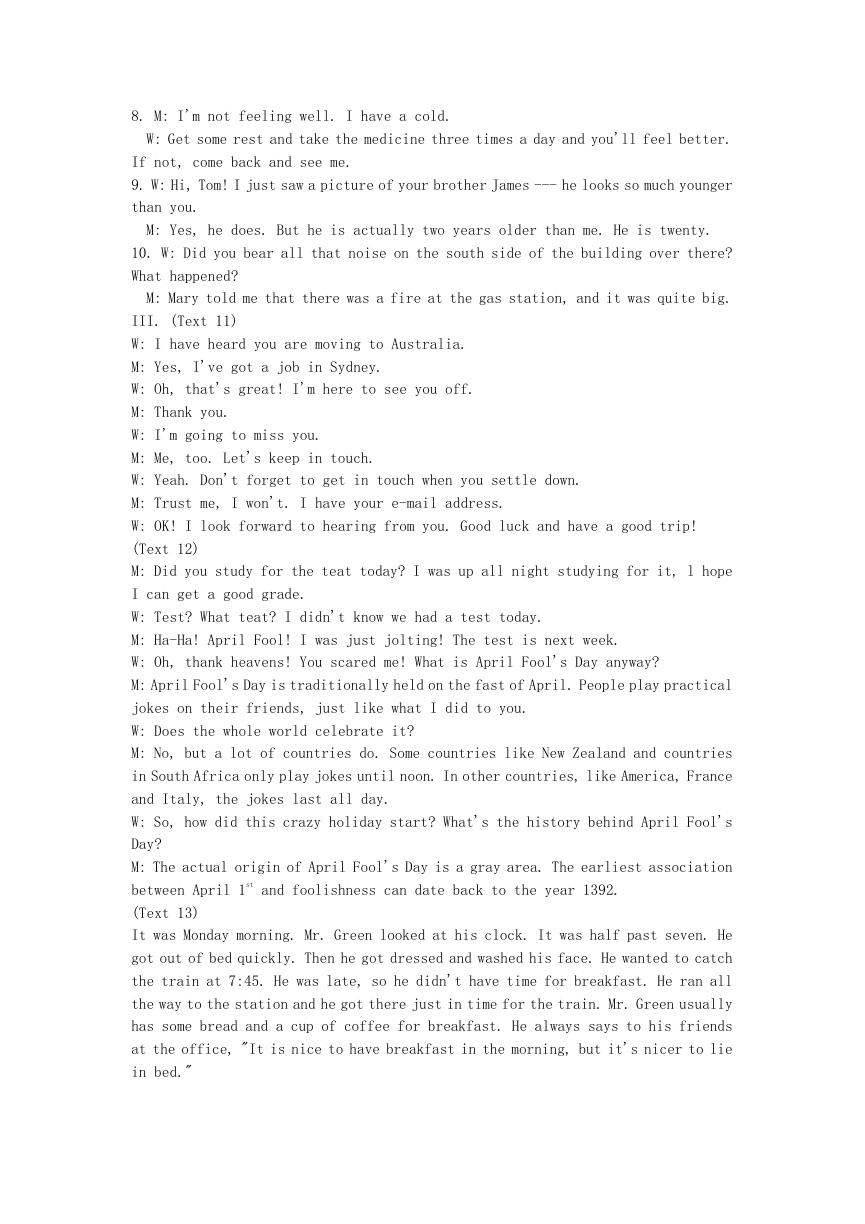








 2023年江西萍乡中考道德与法治真题及答案.doc
2023年江西萍乡中考道德与法治真题及答案.doc 2012年重庆南川中考生物真题及答案.doc
2012年重庆南川中考生物真题及答案.doc 2013年江西师范大学地理学综合及文艺理论基础考研真题.doc
2013年江西师范大学地理学综合及文艺理论基础考研真题.doc 2020年四川甘孜小升初语文真题及答案I卷.doc
2020年四川甘孜小升初语文真题及答案I卷.doc 2020年注册岩土工程师专业基础考试真题及答案.doc
2020年注册岩土工程师专业基础考试真题及答案.doc 2023-2024学年福建省厦门市九年级上学期数学月考试题及答案.doc
2023-2024学年福建省厦门市九年级上学期数学月考试题及答案.doc 2021-2022学年辽宁省沈阳市大东区九年级上学期语文期末试题及答案.doc
2021-2022学年辽宁省沈阳市大东区九年级上学期语文期末试题及答案.doc 2022-2023学年北京东城区初三第一学期物理期末试卷及答案.doc
2022-2023学年北京东城区初三第一学期物理期末试卷及答案.doc 2018上半年江西教师资格初中地理学科知识与教学能力真题及答案.doc
2018上半年江西教师资格初中地理学科知识与教学能力真题及答案.doc 2012年河北国家公务员申论考试真题及答案-省级.doc
2012年河北国家公务员申论考试真题及答案-省级.doc 2020-2021学年江苏省扬州市江都区邵樊片九年级上学期数学第一次质量检测试题及答案.doc
2020-2021学年江苏省扬州市江都区邵樊片九年级上学期数学第一次质量检测试题及答案.doc 2022下半年黑龙江教师资格证中学综合素质真题及答案.doc
2022下半年黑龙江教师资格证中学综合素质真题及答案.doc